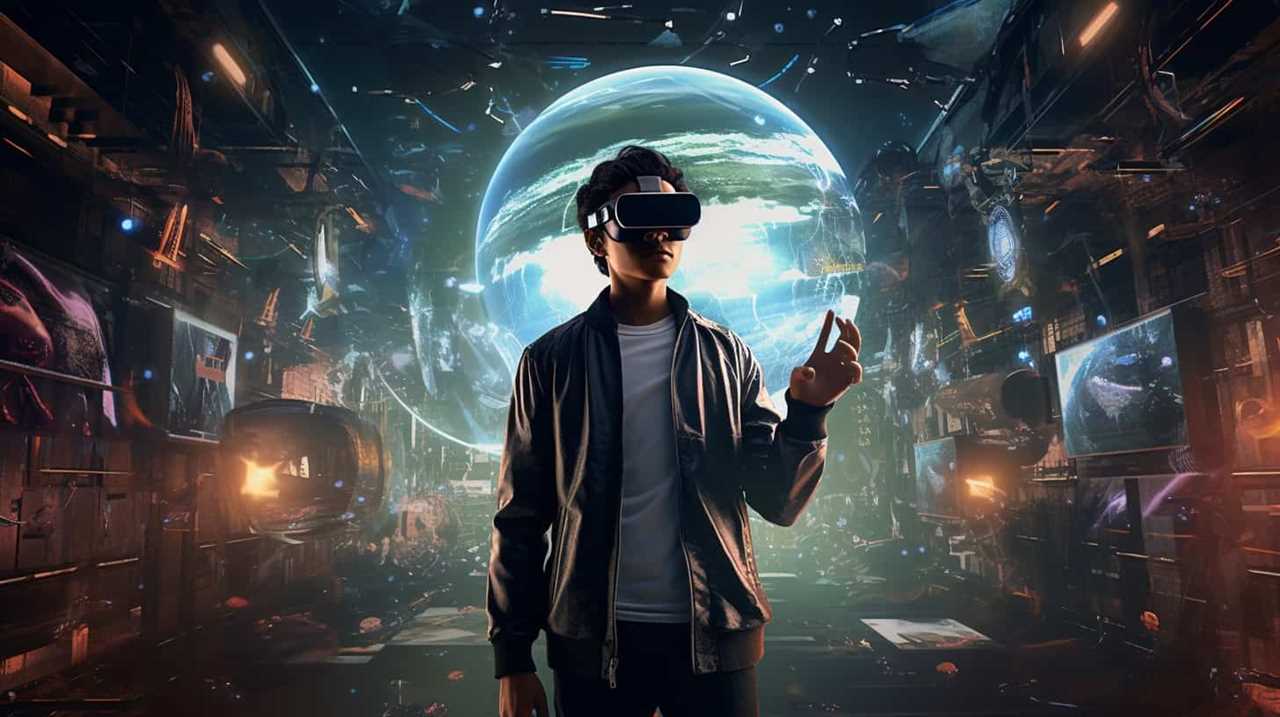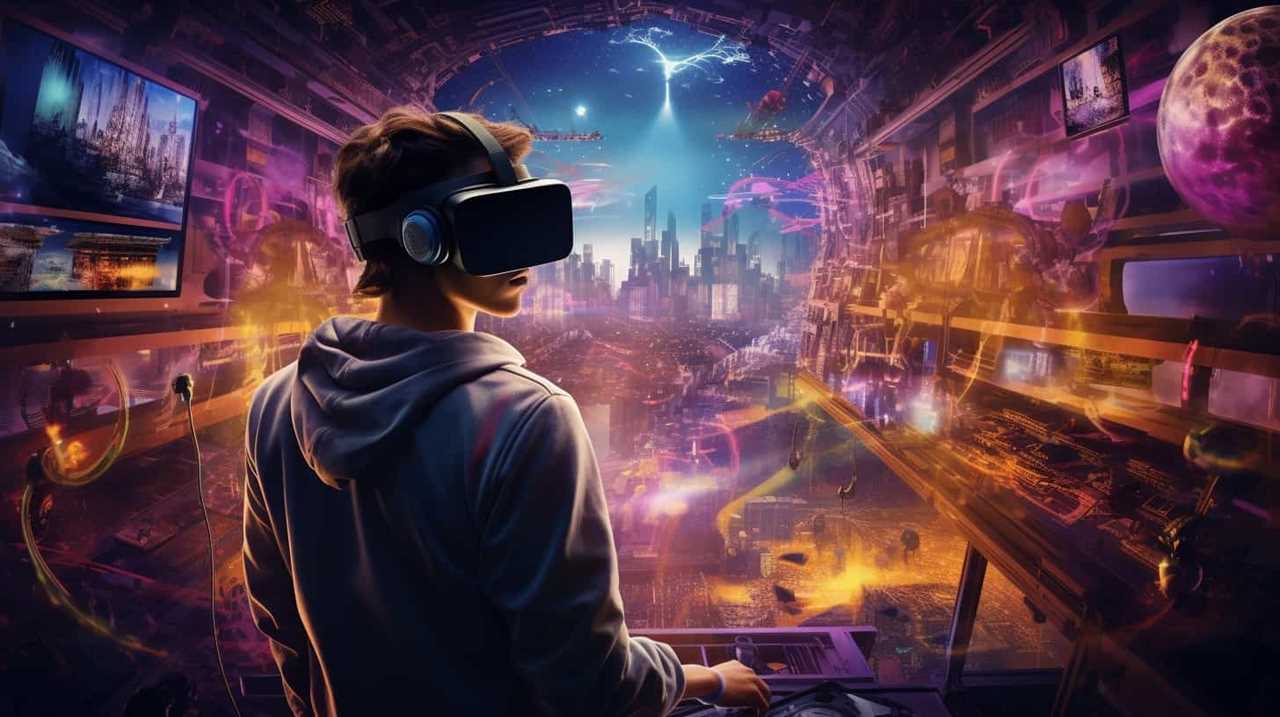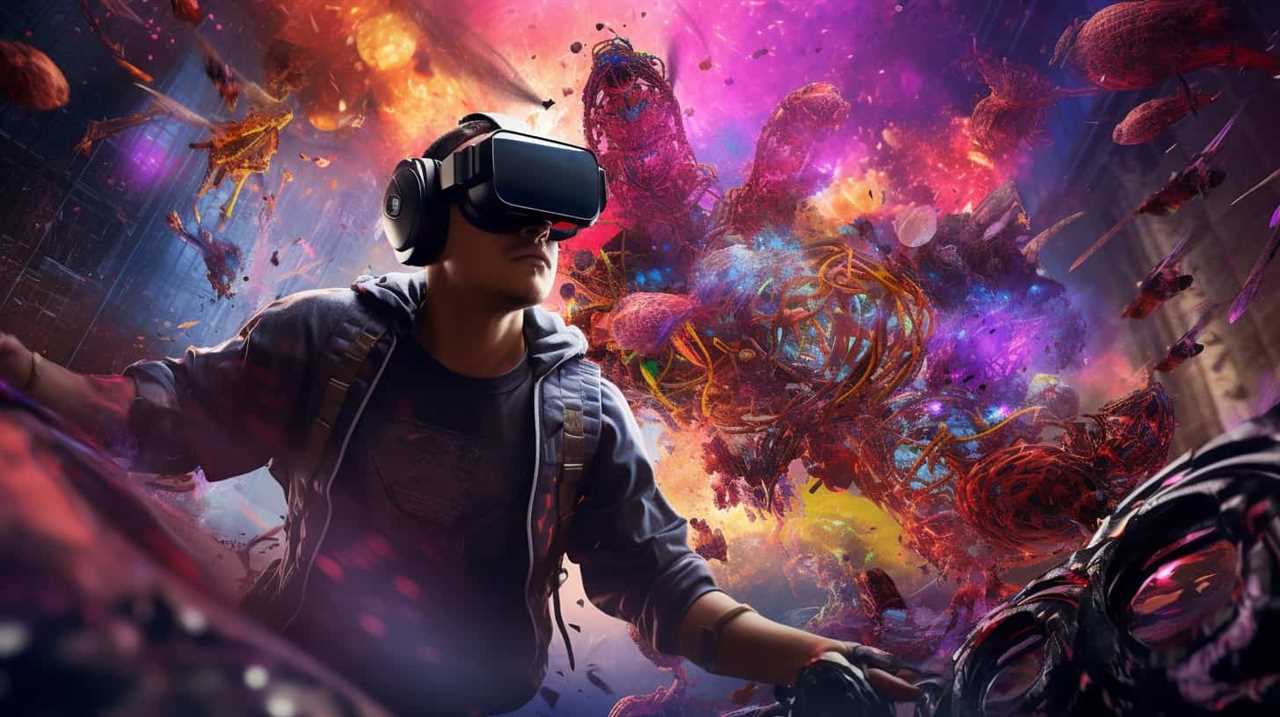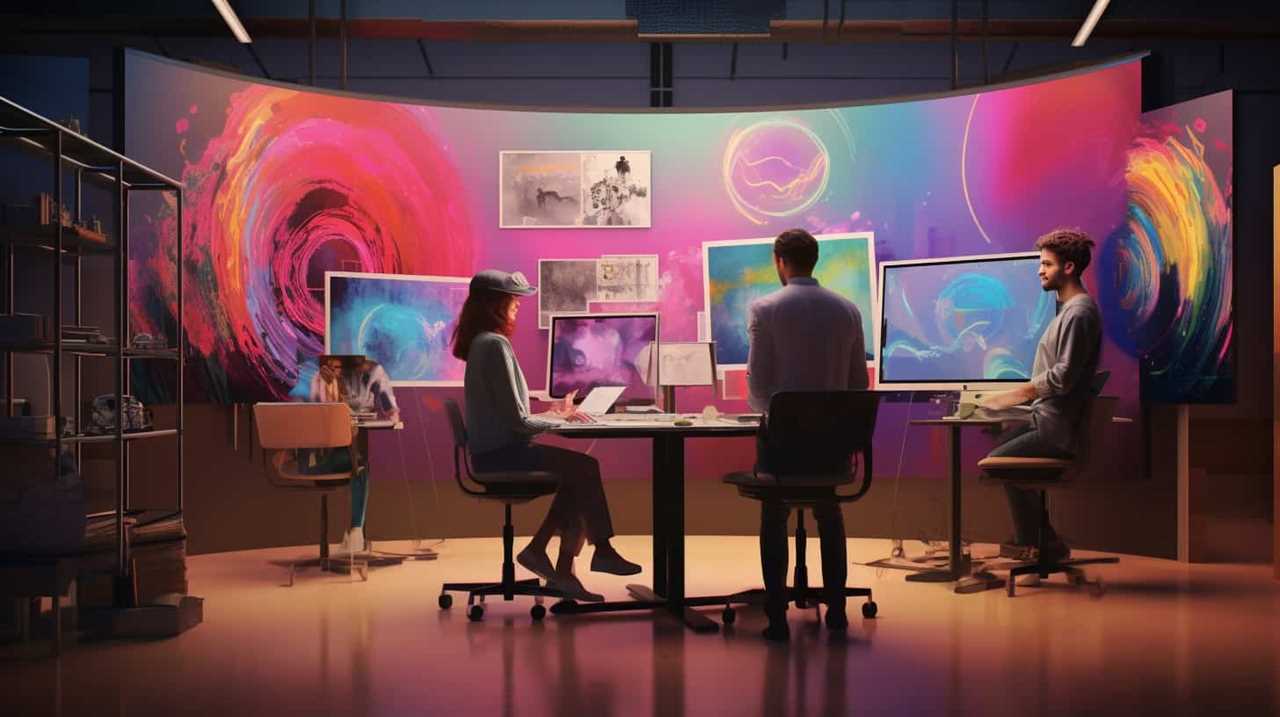We are on the cusp of a new era in virtual reality gaming, where the boundaries of our imagination are expanding thanks to the power of generative AI.
Brace yourselves for an adventure like no other as we unveil the 10 transformative ways that this cutting-edge technology is reshaping our gaming experiences.
From immersive worlds that come alive with realism to NPCs that adapt and surprise us at every turn, get ready to be swept away by the mind-bending possibilities that await.
Innovation has never been this exhilarating.

Key Takeaways
- Generative AI plays a crucial role in creating visually stunning and interactive VR worlds.
- Interactive virtual landscapes in VR gaming provide endless possibilities for exploration and manipulation.
- Adaptive NPCs revolutionize virtual reality gaming by dynamically adjusting their behavior based on player actions.
- Virtual reality gaming allows for infinite variations of challenges and obstacles, as well as tailored experiences based on player preferences.
Enhanced Immersive Experiences
Enhanced immersive experiences in virtual reality gaming are revolutionizing how we perceive and interact with virtual worlds. The integration of virtual reality technology, combined with advanced sensory immersion techniques, has propelled the gaming industry to new heights of innovation.
With enhanced sensory immersion, players can now fully immerse themselves in virtual environments, feeling as if they’re truly a part of the game. This level of immersion is achieved through the use of cutting-edge technology that stimulates our senses, such as realistic visuals, surround sound, and haptic feedback.
The result is a truly transformative gaming experience that transports players to new realms, blurring the line between the real and virtual worlds.
As we delve further into the topic of enhanced immersive experiences, we’ll explore how these advancements have led to the creation of realistic and dynamic environments in virtual reality gaming.

Realistic and Dynamic Environments
As virtual reality gaming continues to evolve, one of the key areas where generative AI is making a significant impact is in creating realistic and dynamic environments.
With the help of AI algorithms, developers can create immersive VR worlds that aren’t only visually stunning but also interactive, allowing players to engage with virtual landscapes in a more meaningful way.
Immersive VR Worlds
One of the most captivating aspects of virtual reality gaming is the creation of immersive VR worlds that transport us to realistic and dynamic environments. With advancements in virtual reality technology and the continuous improvement of virtual reality hardware, developers are able to create virtual worlds that are incredibly lifelike and interactive.
Generative AI plays a crucial role in this transformation, allowing for the generation of realistic landscapes, detailed textures, and dynamic weather systems. These immersive VR worlds provide players with a heightened sense of presence and immersion, making the gaming experience truly unforgettable.

As we dive into these virtual environments, we’re no longer limited by the constraints of the physical world, but instead, we’re transported to fantastical realms where anything is possible.
Now, let’s explore how generative AI is also shaping the development of interactive virtual landscapes.
Interactive Virtual Landscapes
To further enhance our immersive VR experience, generative AI enables the creation of interactive virtual landscapes that are both realistic and dynamic. These interactive gaming environments allow for a new level of virtual reality interaction, where players can explore and interact with their surroundings in ways never before possible.
Through the power of generative AI, virtual landscapes can be generated in real-time, adapting to the player’s actions and creating a truly immersive and responsive experience. Imagine a VR game where you can climb mountains, swim in lakes, and interact with the environment by picking up objects or manipulating the terrain. The possibilities are endless, and generative AI is at the forefront of making these interactive virtual landscapes a reality.

As we dive deeper into the world of VR gaming, let’s now explore how generative AI is also revolutionizing adaptive non-player characters (NPCs).
Adaptive Non-Player Characters (NPCs)
Our experience of virtual reality gaming has been greatly enhanced by the introduction of adaptive non-player characters (NPCs). These NPCs are powered by generative AI, allowing them to behave dynamically and respond intelligently to the player’s actions.
Here are three ways in which adaptive NPCs are revolutionizing virtual reality gaming:
- Adaptive Character Behavior: NPCs now possess the ability to adapt their behavior based on the player’s choices and actions. This adds a new level of realism and immersion to the gaming experience, as NPCs can now exhibit unique personalities and respond in different ways to different situations.
- AI-Generated Dialogues: Rather than relying on pre-scripted dialogues, adaptive NPCs utilize AI-generated dialogues that can dynamically respond to the player’s interactions. This creates more dynamic and engaging conversations, making the virtual reality gaming experience feel more organic and lifelike.
- Real-Time Learning: Adaptive NPCs are capable of learning from the player’s behaviors and adjusting their strategies accordingly. This means that NPCs can become more challenging over time, ensuring that the gameplay remains engaging and stimulating.
With the integration of adaptive NPCs, virtual reality gaming is entering a new era of immersive and interactive experiences. The combination of adaptive character behavior, AI-generated dialogues, and real-time learning brings virtual worlds to life like never before.

Procedural Content Generation (PCG)
When it comes to Procedural Content Generation (PCG), generative AI has opened up a world of possibilities for virtual reality gaming. One of the most exciting aspects is the ability to create infinite game worlds, where no two playthroughs are ever the same. This allows for dynamic level design, where the environment is constantly adapting and evolving based on the player’s actions.
Generative AI can also personalize the player experience by tailoring the content to suit their preferences and playstyle. This means that each player can have a unique and customized gaming experience, making the game more engaging and immersive.
Infinite Game Worlds
We have witnessed the revolutionary impact of generative AI in virtual reality gaming through the implementation of infinite game worlds using procedural content generation (PCG). This technology allows for the creation of vast and dynamic virtual landscapes that offer endless possibilities for exploration and interaction.
Here are three ways in which infinite game worlds are transforming the gaming experience:

- Endless Exploration: With infinite game worlds, players can explore vast environments that are generated in real-time, providing a never-ending sense of discovery and adventure.
- Interactive Environments: These virtual landscapes aren’t just static backdrops but interactive spaces that respond to player actions. From changing weather patterns to dynamically evolving ecosystems, the environment adapts and evolves alongside the player.
- Limitless Creativity: Infinite game worlds empower players to become creators themselves. With procedural content generation, players can generate unique landscapes, structures, and even entire civilizations, allowing for unparalleled levels of creativity and personalization.
As the boundaries between virtual and real worlds blur, infinite game worlds are pushing the boundaries of what’s possible in virtual reality gaming. With these immersive and interactive environments, players can truly lose themselves in a world of endless exploration and creativity.
Now, let’s delve into the next exciting development in virtual reality gaming: dynamic level design.
Dynamic Level Design
Continuing the exploration of generative AI’s transformative impact on virtual reality gaming, dynamic level design is revolutionizing the gaming experience by utilizing procedural content generation (PCG).
With the advent of generative AI, game developers can now create virtual worlds that aren’t only visually stunning but also dynamically changing and infinitely replayable.

Procedural generation algorithms enable the creation of game levels, environments, and scenarios that are generated on-the-fly, ensuring a unique experience for each playthrough.
This approach to level design promotes emergent gameplay, where players are constantly faced with new challenges and opportunities.
Personalized Player Experiences
Building upon dynamic level design, generative AI is revolutionizing virtual reality gaming by offering personalized player experiences through procedural content generation (PCG).
Tailored Environments: Generative AI algorithms analyze personalized player preferences to create customized gaming experiences. By considering factors such as preferred difficulty level, preferred game mechanics, and preferred visual aesthetics, the AI can dynamically generate virtual environments that cater to each player’s unique tastes and preferences.

Unique Challenges: Procedural content generation allows for the creation of infinite variations of challenges and obstacles within the game. This ensures that players are constantly presented with new and exciting experiences, keeping the gameplay fresh and engaging.
Adaptive Narratives: With generative AI, virtual reality games can adapt their narratives in real-time based on the player’s choices and actions. This creates a highly immersive and personalized storytelling experience, where players feel like the protagonist and have a direct impact on the outcome of the game.
By offering personalized player experiences, generative AI is transforming virtual reality gaming into a realm of customized gaming experiences that cater to the individual preferences of each player.
Now let’s explore how personalized gameplay experiences are being enhanced by generative AI.

Personalized Gameplay Experiences
Enhancing immersive gameplay through tailored experiences, generative AI revolutionizes virtual reality gaming. With AI-driven challenges and customized gameplay, players can now enjoy personalized experiences that adapt to their skills and preferences.
By analyzing player behavior, generative AI algorithms can dynamically adjust the difficulty level of the game, ensuring a challenging yet enjoyable experience. This personalized approach not only enhances player engagement but also provides a sense of accomplishment as players overcome increasingly difficult obstacles.
Additionally, generative AI can create unique gameplay scenarios based on individual player profiles, creating a truly customized experience. Whether it’s adapting the game environment, enemy behavior, or puzzle solutions, generative AI ensures that each player’s journey through the virtual world is unique and tailored to their preferences.
This level of personalization elevates virtual reality gaming to new heights, offering players an innovative and immersive experience like never before.

Intelligent Game Design and Balancing
A key aspect of generative AI’s impact on virtual reality gaming is its ability to intelligently design and balance games for an optimal player experience. By analyzing vast amounts of data and leveraging machine learning algorithms, generative AI can revolutionize gameplay mechanics and enhance player engagement in the following ways:
- Adaptive Difficulty: Generative AI can dynamically adjust the difficulty level of a game based on the player’s skill and performance. This ensures that the game remains challenging yet enjoyable, providing a personalized experience for each player.
- Procedural Level Generation: With generative AI, game worlds can be generated procedurally, offering infinite possibilities and unique experiences. This not only saves development time but also creates immersive environments that keep players engaged and excited.
- Real-time Balancing: Generative AI can continuously monitor player interactions and adjust game elements, such as enemy strength or loot drop rates, to maintain a balanced and fair gameplay experience. This prevents frustration and ensures that players stay immersed in the game.
Generative AI’s intelligent game design and balancing capabilities have the potential to revolutionize virtual reality gaming, creating captivating experiences that keep players coming back for more.
Natural Language Processing and Voice Commands
As technology continues to advance, one of the exciting developments in virtual reality gaming is the integration of natural language processing and voice commands.
This innovation allows players to control their virtual reality experiences through voice commands, making the interaction more seamless and immersive.

With improved user interaction, players can navigate through virtual environments, interact with objects, and even communicate with in-game characters using their own voice, adding a new level of realism and immersion to the gaming experience.
Voice-Controlled VR Experiences
How can generative AI enhance virtual reality gaming through voice-controlled experiences?
Voice-controlled VR headsets powered by virtual reality voice recognition technology are revolutionizing the way we interact with virtual worlds. Here are three ways voice-controlled VR experiences are transforming gaming:
- Immersive Gameplay: By using voice commands, players can seamlessly control their in-game actions, such as commanding characters, casting spells, or navigating through virtual environments. This enhances immersion and provides a more natural and intuitive gaming experience.
- Hands-Free Interaction: Voice-controlled VR eliminates the need for physical controllers, allowing players to navigate, interact, and communicate solely through their voice. This frees up their hands for more realistic gestures or other activities while enhancing convenience and minimizing physical fatigue.
- Enhanced Social Interactions: Voice-controlled VR enables players to communicate with other players in real-time, fostering more engaging social interactions. Whether it’s coordinating strategies in multiplayer games or simply chatting with friends, voice commands create a more immersive and collaborative gaming environment.
Voice-controlled VR experiences powered by generative AI are pushing the boundaries of virtual reality gaming, making it more accessible, immersive, and social.

Improved User Interaction
Generative AI enhances user interaction in virtual reality gaming through natural language processing and voice commands. By incorporating these technologies, players can engage with the virtual world in a more immersive and intuitive way. Natural language processing allows players to communicate with the game using their voice, enabling them to give commands, ask questions, and engage in dialogue with virtual characters. This not only enhances the gameplay experience but also improves player interaction by creating a more realistic and dynamic environment. Voice commands enable players to control their in-game actions, such as casting spells, opening doors, or interacting with objects, simply by speaking the commands aloud. This level of convenience and interactivity enhances user engagement and makes virtual reality gaming more accessible and enjoyable.
To illustrate the impact of improved user interaction through natural language processing and voice commands, consider the following table:
| Enhanced User Engagement | Improved Player Interaction | |
|---|---|---|
| 1 | Immersive and intuitive gameplay experience | Realistic and dynamic environment |
| 2 | Interact with virtual characters through dialogue | Control in-game actions with voice commands |
| 3 | Increased accessibility and convenience | More engaging and enjoyable gaming experience |
| 4 | Seamless integration of voice commands | Intuitive and responsive gameplay |
| 5 | Enhanced immersion and realism | Intuitive communication with the virtual world |
Advanced Physics and Simulation
Using generative AI, we’re revolutionizing virtual reality gaming by enhancing advanced physics and simulation. With the help of advanced AI algorithms, we’re able to create realistic virtual physics that significantly improve the immersive experience for players. Here are three ways in which this technology is transforming the gaming landscape:
- Realistic Object Interactions: Through generative AI, we can simulate the behavior of objects in the virtual world with incredible accuracy. This means that players can now interact with virtual objects in a way that closely resembles real-life physics.
- Dynamic Environments: Advanced physics and simulation algorithms allow for the creation of dynamic environments that respond to player actions in real time. This adds an extra layer of complexity and excitement to the gaming experience.
- Fluid Character Movement: By incorporating realistic physics simulations, we can create characters that move and react to their surroundings in a more lifelike manner. This enhances the sense of presence and immersion, making the virtual world feel more tangible and engaging.
As we explore the possibilities of generative AI in virtual reality gaming, we’re also harnessing its potential to revolutionize AI-driven storytelling and narrative.

AI-Driven Storytelling and Narrative
We are harnessing the power of generative AI to revolutionize virtual reality gaming by leveraging AI-driven storytelling and narrative. By using AI algorithms, we can create dynamic and immersive narratives that adapt to the player’s choices and actions, providing a more personalized gaming experience.
One of the key aspects of AI-driven storytelling is AI-driven character development. Through sophisticated machine learning techniques, virtual characters can evolve and respond to the player’s interactions, creating a sense of realism and depth. This allows for more engaging and meaningful interactions within the game world.
Additionally, interactive narrative design plays a crucial role in creating compelling experiences. With AI, narratives can branch out in multiple directions based on the player’s decisions, leading to different outcomes and experiences. This level of interactivity enhances replayability and keeps players invested in the story.
Deep Learning for Real-Time Decision Making
One key aspect of AI-driven storytelling and narrative in virtual reality gaming is the utilization of deep learning for real-time decision making. This revolutionary technology allows for the creation of dynamic and immersive gaming experiences that adapt to the player’s actions and choices in real time.

Here’s how deep learning is transforming real-time decision making in virtual reality gaming:
- Real-time analytics: Deep learning algorithms analyze vast amounts of data in real time, enabling the game to respond instantly to the player’s actions and adjust the narrative accordingly.
- Predictive modeling: By leveraging predictive modeling techniques, deep learning algorithms can anticipate the player’s next moves and adjust the game’s storyline to create a more personalized and engaging experience.
- Adaptive gameplay: Deep learning enables virtual reality games to adapt to the player’s skill level and preferences, ensuring a challenging yet enjoyable gaming experience that keeps players engaged and entertained.
With the integration of deep learning for real-time decision making, virtual reality gaming is becoming more immersive, dynamic, and personalized than ever before.
Frequently Asked Questions
How Does Generative AI Enhance the Immersive Experiences in Virtual Reality Gaming?
Generative AI enhances immersive experiences in virtual reality gaming by enhancing realism and improving user interactivity. It allows us to create more lifelike environments, realistic physics, and adaptive NPCs, making the gaming experience more engaging and innovative.
What Are Some Examples of Realistic and Dynamic Environments Created by Generative AI in Virtual Reality Gaming?
In the world of virtual reality gaming, generative AI has revolutionized the way we experience interactive simulations. By creating lifelike game worlds, it immerses players in realistic and dynamic environments, enhancing the overall gaming experience.

How Does Generative AI Contribute to the Adaptive Behavior of Non-Player Characters (Npcs) in Virtual Reality Gaming?
Generative AI plays a crucial role in character development and enhances NPC interactions. By adapting to player actions and learning from experiences, NPCs become more realistic and engaging, creating immersive virtual reality gaming experiences.
Can You Explain How Procedural Content Generation (Pcg) Is Used in Virtual Reality Gaming and Its Impact on Gameplay?
Procedural content generation (PCG) in virtual reality gaming is revolutionizing gameplay. The impact of PCG on gameplay is immense, and it is made possible by the role of generative AI in creating adaptive behavior of NPCs.
How Does Generative AI Personalize Gameplay Experiences in Virtual Reality Gaming?
Generative AI enhances gameplay experiences in virtual reality gaming by personalizing challenges and impacting player decision making. It creates unique and tailored scenarios, making the game more immersive, engaging, and innovative.
Conclusion
Generative AI is revolutionizing virtual reality gaming by unlocking enhanced immersive experiences, realistic and dynamic environments, adaptive NPCs, procedural content generation, personalized gameplay, natural language processing, advanced physics, AI-driven storytelling, and deep learning for real-time decision making.

This powerful combination of technologies not only brings games to life but also elevates them to a whole new level of realism and interactivity.
Virtual reality gaming has never been more captivating and thrilling, thanks to the transformative capabilities of generative AI.
Get ready to dive into a world where euphoria meets technology.









